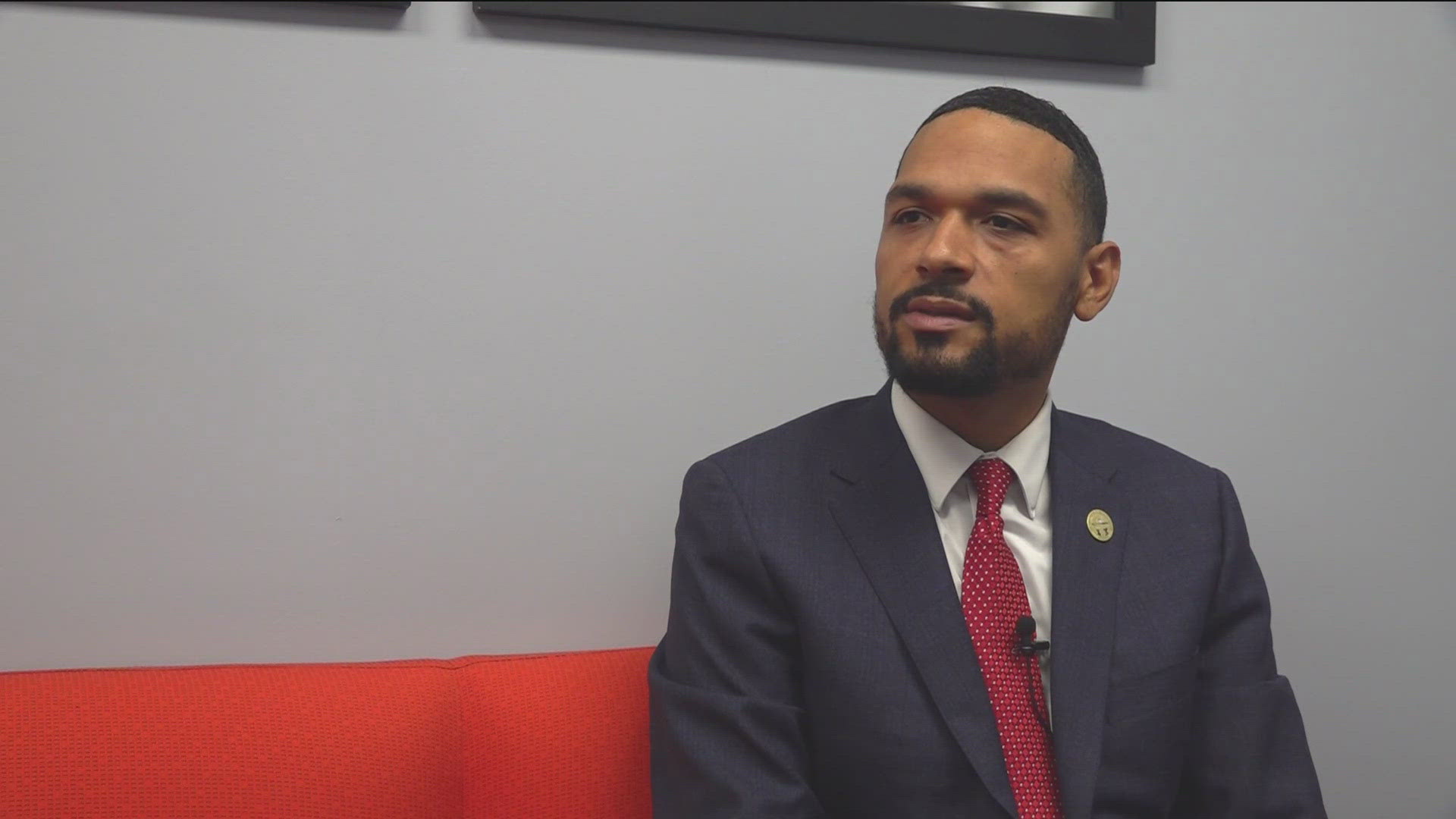WILBERFORCE, Ohio — Two former Ohio mayors running for governor squared off Tuesday evening in the last of a series of debates at Central State University.
The Ohio Debate Commission hosted the debate between Democratic contenders John Cranley and Nan Whaley after hosting debates Monday among contenders seeking the Democratic and Republican nominations in the race to replace retiring Sen. Rob Portman.
Earlier this month incumbent Gov. Mike DeWine declined to participate in the debate.
DeWine's Republican primary challengers are U.S. Rep. Jim Renacci, of Wadsworth; Franklin County farmer Joe Blystone; and state Rep. Ron Hood, of Pickaway County. The debate commission said it never heard back from Hood and Renacci only agreed to participate if DeWine did, which prompted the commission to cancel the planned debate for the Republican slate of gubernatorial candidates.
John Cranley, the mayor of Cincinnati for the last 13 years, is aiming to modernize Ohio's infrastructure and economy with proceeds from legalizing marijuana and to extract money from energy companies for homeowner rebates. When Cranley announced he was running for governor, he said the GOP-controlled state legislature has been tainted by corruption and puts the interests of big corporations over workers.
Nan Whaley, Dayton's mayor and a progressive Democrat, is aiming to make history by becoming the state's first female major-party nominee for governor. Whaley said at the time of her bid to run for governor, the state's GOP-dominated state legislature isn't working and Ohio needs to do more to recover from the pandemic.
Below are several issues discussed and the candidates' responses.
ISSUE: Even as gun violence is a major problem in Ohio Gov. Mike DeWine has signed bills such as stand-your-ground and permitless concealed carry that weaken the state's gun laws. How would you address gun violence in Ohio?
Whaley: The mayor described an event after the Aug. 4, 2019 mass shooting in her city that killed nine people and injured 27 more at which mourners implored Gov. Mike DeWine to "do something."
"Never in my worst nightmare did I think the thing he was going to do was actually make it worse," she said.
Whaley said she would push back against radical gun bills that would make Ohioans less safe and she would fight for universal background checks for gun buyers, something nine out of 10 Ohioans support.
Cranley: "I agree with Nan, Mike DeWine did make it worse. Signing that bill (permitless concealed carry) as well as stand your ground is a stain on his soul."
Cranley said he sees gun violence as a public-health emergency and pledged he would fight for universal background checks for gun buyers. He said many gun suicides and much inner-city violence can be traced to illegal guns and he believes background checks can help cut the number of illegal guns on the streets.
Issue: Regarding the issue of abortion, how would you protect the right to privacy and access to abortion in Ohio?
Cranley: "I am pro-choice and as governor I plan to veto any effort to limit access to abortion."
Cranley acknowledged that he has changed his position on abortion, saying that since he was raised Catholic he previously felt differently. He said that going through fertility treatments with his wife he came to realize that government has no place in reproductive decisions.
Whaley: "I'm the only candidate who has been pro-choice my whole career... As governor I'll make sure I will veto any bill that attacks access."
Whaley pointed to her track record of fighting to keep Dayton's abortion clinic open and said she would appoint a pro-choice director of the Ohio Department of Health.
Both candidates said that as Republicans control Ohio's General Assembly and many observers expect the U.S. Supreme Court to strike down Roe v. Wade later this year, returning the decision about whether to keep abortion legal to states, it is crucial for Ohio to elect a pro-choice governor who will veto bills that would outlaw abortion.
Issue: As many Ohio-raised college graduates end up moving to other states to seek good jobs, what will you do to keep Ohio's college graduates in Ohio?
Cranley: "We have to grow again. So much of the state is used to decline and that people move away.... Cincinnati was like that. We were losing population my whole life and now it is growing again. What makes vibrancy happen are our values."
Cranley said prioritizing diversity and inclusion and investing in cities is key to making it possible for Ohio's college graduates to stay here to begin their careers.
Whaley: "The answer to Ohio's young adults can't be if you want a good job move to Columbus."
Whaley blamed Ohio's brain drain on Republican policies that cut taxes on wealthy people and big multi-national corporations while slashing funding for Ohio communities.
"They cut funding to our cities so they couldn't grow and build. It is not an answer for our state."
Instead Whaley said Ohio should invest in new technology like renewable energy, make sure we have good union jobs and make sure state funds communities
Issue: As many states take on the issue of police accountability and reform, would you sign an executive order ending qualified immunity for Ohio law enforcement officers?
Whaley: "Every family in Ohio, no matter what the you look like, deserves to go to bed without violence in their communities and they deserve respect and dignity from police."
Whaley discussed her work in Dayton, after the 2020 murder of George Floyd, to bring communities and police together to collaborate on reforms. The city launched an "alternative response model" in which mental-health providers are sometimes dispatched to emergency scenes instead of police, if that's what's necessary.
She said she would adopt the same policies statewide if she is elected governor.
Cranley: "Police-community issues have been a defining issue I have grappled with in my career."
Cranley recalled a period, after several unarmed black men were killed in Cincinnati, when the city was being boycotted. He described leading reforms, including arbitration reform to make it easier to fire bad officers as well as the use of body cameras, which he said has turned the city around.
"We've made real change. Shootings are down, but arrests are down 50 percent over 20 years."
He said that as governor he would expand the same types of reforms statewide.
Neither Cranley nor Whaley said they would sign an executive order to end qualified immunity for police officers, however.
Watch the debate with Democratic candidates running for Senate:
Watch the debate with Republican candidates running for Senate:



